Helen H. Moore's Blog, page 706
July 27, 2016
Donald Trump thinks LGBT lives matter—but only if they’re victims of a terrorist attack
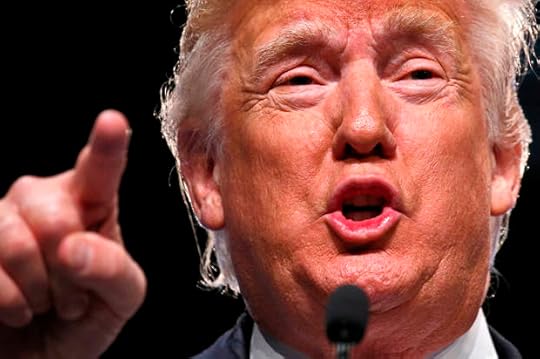
Donald Trump (Credit: Reuters/Carlo Allegri)
Can Donald Trump score with LGBT voters?
Gregory T. Angelo, president of the Log Cabin Republicans, believes he can. In 2012, an estimated 31 percent of queer and transgender voters cast a ballot for Mitt Romney, who did little to court the LGBT community during his presidential run. Richard Grenell, a gay Republican who served as the national security and foreign policy spokesman for Romney’s campaign, was forced to step down from his position following a backlash about his sexual orientation. After initially refusing to do so, Romney signed a “Marriage Vow” to oppose same-sex unions in August 2012.
Given that Romney still finished with nearly a third of LGBT votes, Angelo thinks Trump could go even further. “I think there’s an opportunity, especially given the explicit outreach Donald Trump has made to the LGBTQ community,” he told the Washington Examiner.
In stark contrast to Romney, Trump has marketed himself as a “friend” the LGBT community, claiming he would do more to prevent future attacks like those on Pulse nightclub than Hillary Clinton. At the RNC, Trump addressed the attack head-on. “Only weeks ago in Orlando, Florida, 49 wonderful Americans were savagely murdered by terrorists,” he said. “As your president I will do everything in my power to protect LGBTQ citizens.” (This is despite the fact that the Pulse shooter, although he claimed allegiance to ISIS, reportedly didn’t know the difference between the militant Islamic group and Hezbollah.)
Lynne Patton, the vice president of the Eric Trump Foundation, affirmed the elder Trump’s support for the community in a speech at the RNC. Patton said that Trump “knows LGBTQ lives matter.”
It’s worth asking, however: When do the lives of LGBT people matter to Donald Trump? His support for LGBT protections appear to extend solely to terrorist attacks. Take heart: If you, as a queer person, should be targeted by ISIS, Trump is on your side. But that’s about it. Should you want to be able to marry your partner, patronize a business without being openly discriminated against, be out at work without the fear of losing your job, adopt children, get HIV medication, or escape the horror of conversion therapy as a minor, Trump represents a profound threat to your basic human rights.
Jim Obergefell, the plaintiff in Obergefell v. Hodges, the landmark 2015 Supreme Court case that legalized same-sex unions in all 50 states, called out Trump’s platform for what it is—hollow pandering. In a recent C-SPAN interview, he told the network that Trump would do little to uphold his marriage rights. “He is not a supporter of the LGBTQ community,” Obergefell said. “He is not our friend in any way, shape or form.”
Obergefell, a realtor and IT consultant, fought for years to overturn his state’s prohibition on same-sex marriage. In 2004, Ohio was one of 11 states that passed constitutional amendments restricting the definition of marriage to a union between one man and one woman. In 2013, Obergefell wed John Arthur in Maryland—on the tarmac of the Baltimore Washington International Airport—but the couple’s home city of Cincinnati wouldn’t recognize their marriage.
Arthur, who had been diagnosed with ALS two years earlier, passed away just months after the wedding. It was the culmination of a 21-year relationship.
Trump, if elected to the Oval Office, has stated that he would “strongly consider” appointing Supreme Court judges who will ensure that marriage equality is overturned. “I disagree with the court in that it should have been a states’ rights issue,” Trump told Fox News.
Last week, the Republican National Committee strengthened its own opposition to same-sex unions—putting language into its platform that recalled the very constitutional amendment which kept Jim Obergefell and John Arthur from having their marriage recognized. “Traditional marriage and family, based on marriage between one man and one woman, is the foundation for a free society and has for millennia been entrusted with rearing children and instilling cultural values,” the official GOP platform now states.
Despite speculation the party would move to the center on social issues, the Republicans took a hard turn to the right in Cleveland. In last week’s deliberations, GOP delegates took a stand against every modicum of progress for LGBT people, a platform Trump has vowed to uphold in office.
The party platform, as passed, now explicitly condemns same-sex households. “Children raised in a two-parent household tend to be physically and emotionally healthier, more likely to do well in school, less likely to use drugs and alcohol, engage in crime or become pregnant outside of marriage,” it reads.
In addition, the GOP formally came out against the Obama administration’s stance on bathroom access for transgender students.
This May, the federal government offered its official guidance to K-12 schools on providing affirming resources to trans youth; this includes allowing them to use the restroom that most closely corresponds with their gender identity. This policy is based on the administration’s interpretation of Title IX of the Education Amendment of 1972, which prohibits discrimination in schools on the basis of race and sex. In 2014, Obama administration issued a memo arguing that those rights also extended to gender identity.
In response, the GOP platform stated that the administration’s interpretation of Title IX is “illegal [and] dangerous.”
“That… provision of law is now being used by bureaucrats—and by the current President of the United States—to impose a social and cultural revolution upon the American people by wrongly redefining sex discrimination to include sexual orientation or other categories,” it reads. “Their agenda has nothing to do with individual rights; it has everything to do with power. They are determined to reshape our schools—and our entire society—to fit the mold of an ideology alien to America’s history and traditions.”
Although LGBT supporters might claim that Trump does not share the beliefs of his party, the billionaire businessman has repeatedly walked back his stated support of affirming trans bathroom access. After North Carolina passed House Bill 2, a controversial law that prohibited trans people from using the restroom that corresponds with their gender identity, he decried the legislation.
“There has been so little trouble,” Trump told Matt Lauer in May.
He notably flip-flopped on that stance the very same day, later saying that it should be a states’ rights issue, before coming out in support of Gov. Pat McCrory, the governor who pushed through the legislation, during a July rally. “I’m going with the state,” Trump told supporters in Raleigh, N.C.. “The state, they know what’s going on, they see what’s happening and generally speaking I’m with the state on things like this. I’ve spoken with your governor, I’ve spoken with a lot of people, and I’m going with the state.”
The platform also supports conversion therapy, which attempts to “cure” queer youth of their same-sex attractions. The practice has been denounced by every leading psychological association.
Conversion therapy was, however, notably heralded by his running mate, Indiana Gov. Mike Pence, when running for Congress in 2000. Pence’s campaign website boasted that if elected to the House of Representatives, he would do everything in his power to redirect funds from the Ryan White Care Act, a federal program for HIV funding, to “those institutions which provide assistance to those seeking to change their sexual behavior.”
The Ryan White Care Act, which was enacted in 1990, provides life-saving relief services for low-income people with HIV, who might not otherwise be able to afford their daily meds. Pence’s proposal would have jeopardized 624,000 lives every year, which is the estimated number of people who rely on the program for survival. According to the Health Resources and Services Administration website, that number amounts to 52 percent of all people with HIV in the United States.
Although vice presidents are often viewed as figureheads, Donald Trump is allegedly planning to give Pence unprecedented power in his position. The New York Times reported that when the Trump campaign approached John Kasich in May about being his running mate, Kasich was all but handed the keys to the city. According to the Times, Donald Jr. asked the self-proclaimed moderate: “Did he have any interest in being the most powerful vice president in history?” The outlet adds, “When Kasich’s adviser asked how this would be the case, Donald Jr. explained that his father’s vice president would be in charge of domestic and foreign policy.”
If, as vice president, Pence were in control of domestic policy, that’d spell more bad news for the LGBT community. During his time in Congress, Pence voted against hate crime legislation that would include gender identity and sexual orientation as protected classes, as well as the Employment Non-Discrimination Act (ENDA), which would prohibit workers from being fired for being LGBT. Although marriage equality is legal—for now, at least—you can be let go for having a photo of your legally wedded same-sex partner on your desk in 30 states. This includes Texas, Ohio, which Jim Obergefell and John Arthur called home, and Indiana, Pence’s home state.
Most famously, however, Pence pushed through the Religious Freedom Restoration Act (RFRA) during his time as governor. The so-called “religious liberty” bill allowed companies to refuse business to clientele based on the “sincerely held religious beliefs” of the proprietors. This means that a catering company could decline to service to a lesbian wedding or a restaurant could tell a transgender patron to eat somewhere else.
After mounting public pressure, Pence would amend the law, but not before it did enormous damage to Indiana’s economy—to the tune of $60 million in potential revenue. Twenty-one other states have similar legislation on the books.
When Jim Obergefell claimed that Donald Trump is no friend to the LGBT community, he was perhaps putting it lightly. In the past decade, queer and transgender Americans have made enormous gains across the board, winning unprecedented victories and making major strides in our march toward equality. A Trump presidency would serve as a severe setback, rolling back years of progress and jeopardizing thousands of LGBT lives every single year. The GOP nominee might say he has our back when it comes to terrorist attacks, but who will save us from the terror of Donald Trump?
July 26, 2016
“Even if you don’t like him, you like him”: Twitter reacts to Bill Clinton’s intensely personal DNC speech
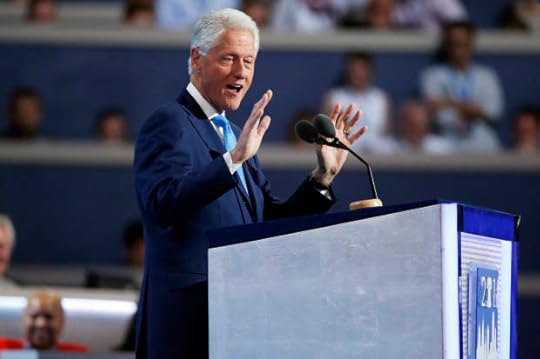
Former President Bill Clinton addresses the Democratic National Convention in Philadelphia, Pennsylvania, U.S. July 26, 2016. REUTERS/Lucy Nicholson - RTSJT9H (Credit: Reuters)
Former President Bill Clinton headlined the second night of the Democratic National Convention on Tuesday, delivering a passionate and personal stump speech on behalf of his wife, Democratic presidential nominee Hillary Clinton.
Clinton opened his speech on a personal note. “In the spring of 1971 I met a girl,” he began, telling the story of his first encounter with Hillary Rodham. “Believe it or not, momentarily, I was speechless.”
WATCH: Bill Clinton shares story of first meeting Hillary: #DNCinPHL #Decision2016 https://t.co/y6Hs5OTwp7
— NBC News (@NBCNews) July 27, 2016
Kinda amazing Bill Clinton once looked like this: pic.twitter.com/f4o9nOgb6d
— andrew kaczynski (@BuzzFeedAndrew) July 27, 2016
This is a crazy historic moment. POTUS talking about glomming onto a girl who might be President (after he got a blowjob to cheat on her)
— emptywheel (@emptywheel) July 27, 2016
… oh, so that story was about *Hillary*?
— Tim Carney (@TPCarney) July 27, 2016
Clinton explained how his future wife influenced him and helped steer him towards a life in government: “Hillary opened my eyes to a whole new world of public service by private citizens.”
Clinton without mentioning Trump's name: "She never made fun of people with disabilities, she tried to empower them."
— andrew kaczynski (@BuzzFeedAndrew) July 27, 2016
Clinton maintained a personal focus throughout the speech, using tales about his family as a recurrent narrative thread as he weaved a long tale recounting his and Hillary’s long careers in government, calling Hillary “the best darn changemaker I’ve ever met in my entire life.”
The word "yarn" doesn't begin to describe this epic by Bill Clinton. pic.twitter.com/zVip0kkMVk
— Brad Mielke (@TheBradMielke) July 27, 2016
One thing's for sure: No one could ever accuse Bill Clinton of plagiarizing this speech.
— Gregory Korte (@gregorykorte) July 27, 2016
"She's a change-maker" shows how worried Clinton camp is about Trump's "Hillary Clinton’s message is that things will never change."
— Bill Kristol (@BillKristol) July 27, 2016
Clinton’s intensely personal speech included accounts of his engagement to Hillary (which he said required multiple marriage proposals) and the birth of their daughter Chelsea:
There's a reason he's dwelling on these parts of HRC biography — they're virtually 100% absent from public consciousness this cycle
— Benjy Sarlin (@BenjySarlin) July 27, 2016
Mission of Bill Clinton's speech tonight: Humanize Hillary. #DemsInPhilly
— Frank Luntz (@FrankLuntz) July 27, 2016
Another first: a story about a presidential nominee’s water breaking. #DemsInPhilly
— Arianna Huffington (@ariannahuff) July 27, 2016
To the surprise of some, Clinton made no mention of his impeachment or the sex scandals of the 1990s in the linear narrative of his marriage, which otherwise painted an intimate picture:
He's dwelling so much on their relationship that he may have to allude at least to troubles in it that he caused, and her forgiveness.
— Ramesh Ponnuru (@RameshPonnuru) July 27, 2016
Ummmm . . . 1998??
— Erick Erickson (@EWErickson) July 27, 2016
For Bill to dwell on 1998 would make it about him, not Hillary.
— Irin Carmon (@irin) July 27, 2016
Clinton’s most memorable moment came when he turned to the choice facing voters in the 2016 election, saying that the difference between the Republican and Democratic campaign narratives is that “One is real, the other is made up.”
.@billclinton calls the @HillaryClinton presented at #RNCinCLE as "fake." #DemsInPhilly pic.twitter.com/m0OKwycYr4
— Mashable News (@MashableNews) July 27, 2016
"One is real. One is made up." I could literally imagine Omar Little saying that. CLINTON COMIN'. #DemsInPhilly
— Patton Oswalt (@pattonoswalt) July 27, 2016
Clinton returned to the personal to wrap up his speech: “I’ve lived a long, full, blessed life. It really took off when I met and fell in love with that girl in the spring of 1971.”
Bill Clinton: "I've lived a long, full, blessed life. It really took off when I met and fell in love with that girl" https://t.co/TJaa8iQq8L
— CNN (@CNN) July 27, 2016
Response to Clinton’s performance was generally positive, with the former president even drawing compliments from some conservatives:
.@brithume on Bill's speech: "He sure has not lost his fastball. I don't know if he has it everyday but he sure had it tonight."
— andrew kaczynski (@BuzzFeedAndrew) July 27, 2016
"Wedding toast gone bad" — Steve Schmidt says of Bill Clinton speech. Says it was too long.
— Michael Barbaro (@mikiebarb) July 27, 2016
Andrew Sullivan on Bill Clinton's "superb" reintroduction of Hillary: https://t.co/lZaW2lgZWH pic.twitter.com/XESrZbiKMi
— New York Magazine (@NYMag) July 27, 2016
Years ago #BillClinton when president was telling staff those stories about young Hillary. Authentic to me. @CNN
— David Gergen (@David_Gergen) July 27, 2016
One week ago, the featured prime time speaker was Ben Carson.
— Matt Viser (@mviser) July 27, 2016
This is why Obama trotted out Bill Clinton in 2012. Even if you don’t like him, you like him.
— Erick Erickson (@EWErickson) July 27, 2016
Bill Clinton charms the DNC with story of Hillary’s life-long commitment to social change
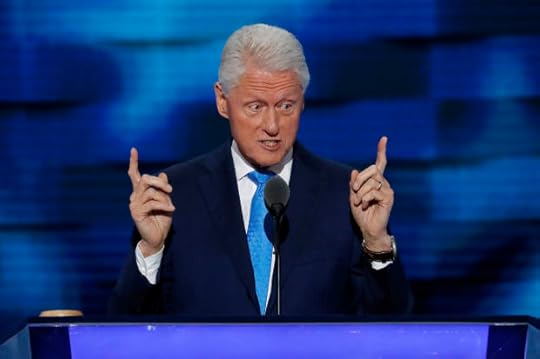
Former President Bill Clinton speaks during the second day of the Democratic National Convention in Philadelphia , Tuesday, July 26, 2016. (AP Photo/J. Scott Applewhite) (Credit: AP)
PHILADELPHIA (AP) — Taking on the role of devoted political spouse, former President Bill Clinton declared his wife Hillary Clinton an impassioned “change-maker,” serving as character witness for her on the night she triumphantly became the first woman nominated for president.
“She’s been worth every single year she’s put into making people’s lives better,” he said of his partner of more than 40 years and the Democratic Party’s new standard-bearer in the race for the White House.
For a man more accustomed to delivering policy-packed stem-winders, Clinton’s deeply personal address underscored the historic night for Democrats, and the nation. If she wins in November, the Clintons would also be the first married couple to each serve as president.
She will take on Donald Trump, who won the Republican nomination a week ago. Trump, who campaigned Tuesday in North Carolina, mocked the former president’s speech in advance, calling him “over-rated.”
Referring to Trump, though not by name, Clinton said there are real and affordable solutions to problems facing the nation but “we won’t get to them if America makes the wrong choice.”
The former president traced his relationship with his wife back more than 40 years, recalling in great detail the first time he spotted her on campus and the impact she had on pushing him into politics.
“Hillary opened my eyes to a whole new world of public service by private citizens,” he said, addressing a convention hall packed to the rafters with delegates listening raptly.
He closed the second night of the Democratic convention, a jubilant celebration of Hillary Clinton’s formal nomination for president. In an important move for party unity, her primary rival Bernie Sanders helped make it official when the roll call got to his home state of Vermont, prompting delegates to erupt in cheers. It was a striking parallel to the role Clinton played eight years ago when she stepped to the microphone on the convention floor in Denver in support of her former rival, Barack Obama.
This time, Clinton shattered the glass ceiling she couldn’t crack in 2008.
She leads a party still grappling with divisions. Moments after Clinton claimed the nomination, a group of Sanders supporters left the convention and headed to a media tent to protest what they said was their being shut out of the party. At the same time, protesters who had spent the day marching in the hot sun began facing off with police.
Trump cheered the disruptions from the campaign trail. In North Carolina, he told a convention of the Veterans of Foreign Wars that, “our politicians have totally failed you.”
Indeed, Clinton’s long political resume — secretary of state, senator, first lady — has sometimes seemed an odd fit for an electorate deeply frustrated with Washington and eager to rally around unconventional candidates like Trump and Sanders. Many voters have questions about her character and trustworthiness, suggesting her years in power give her the impression she can play by different rules.
President Clinton spoke after three hours of testimonials from lawmakers, advocates, celebrities and citizens who argued otherwise. Each took the stage to vouch for Clinton’s commitment to working on health care, children’s issues and gun control.
“Hillary Clinton has the passion and understanding to support grieving mothers,” said Sybrina Fulton, whose son Trayvon Martin was killed in 2012. “She has the courage to lead the fight for commonsense gun legislation.”
The significant time devoted to the character testimonials underscored the campaign’s concerns about how voters view Clinton. Public polls consistently show that a majority of Americans don’t believe she is honest and trustworthy. That perception that was reinforced after the FBI director’s scathing assessment of her controversial email use as secretary of state, even though the Justice Department did not pursue charges.
President Clinton complicated the email controversy last month when he met privately with Attorney General Loretta Lynch in the midst of the FBI investigation. Republicans cast the meeting as a sign that the Clintons play by different rules, while Democrats bemoaned that at the very least, it left that impression.
The former president has campaigned frequently for his wife during the White House race, but mostly in smaller cities and towns, part of an effort by the campaign to keep him in a more behind-the-scenes role. His convention address was his highest profile appearance of the campaign.
Clinton’s landmark achievement saturated the roll call with emotion and symbols of women’s long struggle to break through political barriers. Jerry Emmett, a 102-year-old woman born before women had the right to vote, cast the ballots for Arizona.
Martha McKenna, a Clinton delegate from Maryland, said the night felt like a celebration for Sanders’ campaign as well as Clinton’s. She added, “The idea that I’m going to be here when the first woman president is nominated is overwhelming.”
The Democratic convention drew the party’s biggest stars to sweltering Philadelphia for the week-long event. On Monday night, first lady Michelle Obama made an impassioned case for Clinton as the only candidate in the presidential race worthy of being a role model for the nation’s children. President Barack Obama and Vice President Joe Biden will speak Wednesday, along with Virginia Sen. Tim Kaine, Clinton’s new running mate.
___
AP writers Kathleen Hennessey, Kathleen Ronayne, Ken Thomas and Matthew Daly in Philadelphia contributed to this report.
Howard Dean brings back “the Dean scream” to endorse Hillary Clinton: “She never forgets who she is fighting for!”
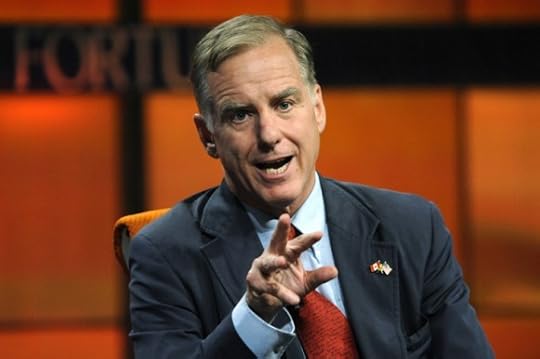
Governor Howard Dean, physician and former chairman of the Democratic National Committee, speaks during the "American Technophile: "How Technology is changing Politics, Governance & Healthcare" panel at the Fortune Tech Brainstorm 2009 in Pasadena, California July 22, 2009. REUTERS/Phil McCarten (UNITED STATES BUSINESS) (Credit: © Phil Mccarten / Reuters)
Former Vermont governor and Democratic presidential hopeful Howard Dean took the stage in Philadelphia Tuesday evening and began by imploring “Democrats, independents, and the millions of Republicans who don’t recognize what they saw in Cleveland and can’t vote for their party’s nominee” to consider voting for Hillary Clinton.
He quickly laid out why, telling a personal story about having met Clinton 25 years ago, “when she was working to achieve a goal — a goal Harry Truman aspired to nearly a century ago, to give us all universal health care.”
“Between the aspirations of Truman and the accomplishments of Barack Obama,” Dean said, “there was Hillary Clinton, poised and persistent. When her first attempt at health care did not work out, she could’ve given up. Instead, she fought the way she always does — because she never forgets who she is fighting for.”
“Because of her effort,” he continued, “the State Children’s Health Insurance Program was born, and she worked just as hard to make sure the states actually signed up, working with Republican governors to get it done.”
He noted that 8 million children have health insurance as a result. “Now we need to elect the person who will finish the job,” he said, “Clinton has a plan to drive down health care costs, stand up to the drug companies and lower prescriptions prices, and take us the last mile and finally achieve health care for all Americans.”
Dean compared that Trump’s plan, which consists of “ripping up Obamacare and throwing 20 million people off of health insurance, taking us back to a time when insurance companies could deny [people] coverage if you have a preexisting condition or charge women more for being women.” He complained that Trump’s replacement is “something better, something ‘yuuuuuge‘ no doubt — that’s it, that’s his whole plan.”
He ended the speech by bringing back his infamous “scream” to the delight of the crowd.
What would you do with a free $1,000 each month? Discussing an income floor at the DNC
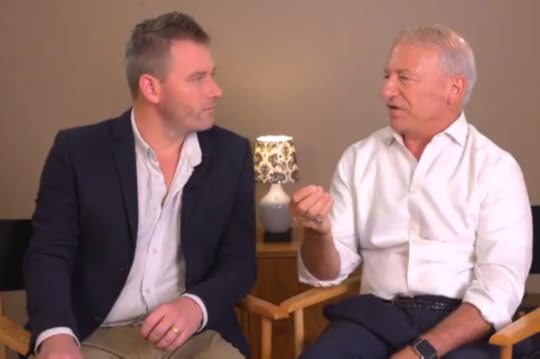
What would happen if the government handed out a monthly check to every person in the country?
It might sound novel, but the idea of a Universal Basic Income isn’t new — thinkers like Martin Luther King and conservative economist Milton Friedman championed the concept, and Finland and the Netherlands will run experimental pilot programs in 2017.
Andy Stern, a senior fellow at Columbia University and the author of “Raising The Floor,” thinks that the best way to help workers deal with the growing impact of automation on the labor force is the institution of a Universal Basic Income program. Stern discussed government-subsidized minimum incomes with moderator Josh Zepps at the Democratic National Convention on Tuesday in a Facebook Live chat hosted by Salon.
“It won’t end work, it won’t be a substitute for work,” Stern explained. “But it will be a big supplement to work.”
“The belief is that, if you trust people and if you believe in the dignity of people’s own lives, then you give them choices,” he continued. “That’s a conservative idea, but I think it’s a growing, growing idea around the country right now.”
So how would Americans react if everyone had a guaranteed source of money?
Zepps suggested an artistic “leisure class” might emerge were the policy put in place… Or maybe people would just sit around, collect their $1,000 check, and play “Pokemon Go” all day.
Watch the full video above.
WATCH: Lena Dunham and America Ferrara bash Trump — “Why should you care about what some TV celebrity has to say about politics?”
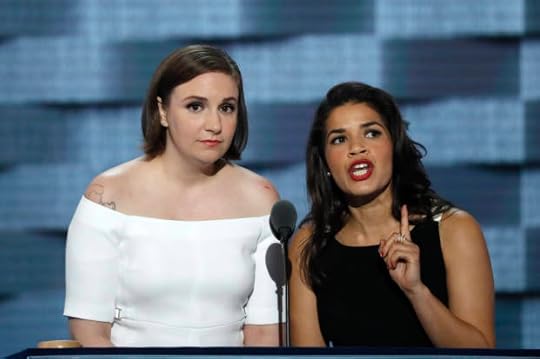
Actresses Lena Dunham and America Ferrera (R) speak on stage at the Democratic National Convention in Philadelphia, Pennsylvania, U.S. July 26, 2016. REUTERS/Mike Segar - RTSJT25 (Credit: Reuters)
Actress and author Lena Dunham has never been shy about sharing her opinion, so it shouldn’t be surprising that on the night the first woman was nominated to lead a major American political party in a presidential election, she and actress America Ferrara took the opportunity to tell Donald Trump exactly how they feel about his campaign to date, as well as his candidacy.
“I’m Lena Dunham, and according to Donald, my body is ‘probably, like, a two,'” she began. Ferrara added that according to him, she’s probably a rapist. When Dunham pointed out that Ferrara isn’t even Mexican, she replied, “and President Obama isn’t Kenyan, but that doesn’t stop Donald.”
“We know what you’re all thinking,” Dunham continued, “why should you care what some television celebrity has to say about politics?”
“We feel the same way,” Ferrara replied, “but he is the GOP nominee, so we have to talk about it.”
“Donald Trump and his party think I should be punished for exercising my constitutional rights,” Dunham added. “Whereas 22 years ago, Hillary Clinton declared that womens’ rights are human rights.”
“I am profoundly grateful for the access and opportunity that exists in this extraordinary nation,” Ferrera, a child of immigrants, noted. “Donald is not making America great again — he is making America hate again.”
Watch their entire presentation below via Twitter.
"Let’s declare: Love trumps hate!” —@AmericaFerrera and @LenaDunham https://t.co/F1SdYjsPmX
— Hillary Clinton (@HillaryClinton) July 27, 2016
“I am an unwilling participant in this movement”: Mothers of the movement deliver powerful testimonies at DNC
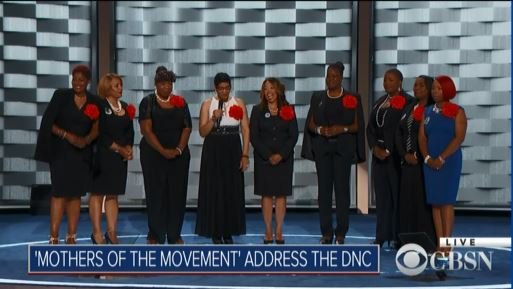
“One life at a time, one mother at a time, we can change the world,” Hollywood actor Tony Goldwyn declared to introduced the so-called Mothers of the Movement on the second evening of the Democratic National Convention on Tuesday.
Nine African-American women who lost their children to police and vigilante violence walked on to the stage at Philadelphia’s Wells Fargo Center with giant red roses affixed to their chests — just above their hearts — and delivered a series of moving testimonies about their lost children and their endorsement of Democratic presidential nominee Hillary Clinton.
Geneva Reed-Veal, mother of Sandra Bland
“One year ago, yesterday, I lived the worst nightmare can imagine,” the mother of the 28-year-old woman who was illegally pulled over and jailed on her way to a brand new job in Texas. Bland died three days after being booked at the county jail for allegedly assaulting an officer. Her funeral was one year ago.
Reed-Veal commanded silence from the room that had just seen a walk-out by a contingent of disgruntled Bernie Sanders delegates to say the names of six other women who died in police custody the same month Bland passed away in 2015.
“I am here with Hillary Clinton because she is a leader who will say our children’s names.”
“What a blessing to be standing here,” Reed-Veal said, choking back tears, “so that Sandy can still speak through her mama.”
Lucia McBath, mother of Jordan Davis
“I lived in fear that my son would die like this,” the mother of the 17-year-old gunned down in a Florida gas station for playing loud music.
“You don’t stop being a parent when your child dies,” McBath said. “I am still Jordan’s mom.”
“Hillary Clinton isn’t afraid to say ‘Black Lives Matter,'” McBath told the crowd. “She isn’t afraid to sit a table with grieving mothers and bare the full force of our anguish.”
“Not only did she listen to our problems, she invited us to be part of the solution. And that is what we are going to do.”
Sybrina Fulton, mother of Trayvon Martin
The final speaker from the group was the mother of the most famous victim of Stand Your Ground.
“This isn’t about being politically correct. This is about saving our children,” Sabrina Fulton, mother of Trayvon Martin told the crowd.
“I am an unwilling participant in this movement,” she said, noting that the fight for reform is as much about the memory of Trayvon as it is about the life of her other son, Jahvaris: “So that this heartbroken club stops growing.”
Mother of Trayvon Martin: “This isn’t about being politically correct. This is about saving our children.” pic.twitter.com/OxLCfO0cfN
— POLITICO (@politico) July 27, 2016
Maria Hamilton, mother of Dontre Hamilton
31-year-old Dontre, a diagnosed paranoid schizophrenic, was sleeping on a park bench when employees from a nearby Starbucks called the police because they thought he was disturbing the peace. After one responding officer determined that Dontre was not breaking the law, former Milwaukee Police Officer Christopher Manney still attempted to pat him down before shooting him 14 times.
No charges were filed against Manney although he was let go from the police department for conducting an illegal pat down.
Gwen Carr, mother of Eric Garner
In a bystander video that went viral, Garner can be heard repeatedly saying “I can’t breathe” while in a chokehold administered by an NYPD officer. Still, a jury decided to not indict the officer, Daniel Pantaleo, on Dec. 13, 2014.
Cleopatra Pendelton, mother of Hadiya Pendleton
The 15-year-old Chicago teenager was shot by two gang members while in a Chicago park with friends on Jan. 29, 2013.
Lezley McSpadden, mother of Mike Brown
The 18-year-old who was killed by a Ferguson, Missouri police officer Darren Wilson.
Wanda Johnson, mother of Oscar Grant
Oscar Grant was killed by a BART police officer in 2009.
Annette Nance-Holt, mother of Blair Holt
The 16-year-old honor student was shot on a Chicago city bus on May 10, 2007.
Crowd shouts “Black Lives Matter” as “Mothers of the Movement” take the stage https://t.co/kGZAs6qruj #demsinPhilly https://t.co/AblQhsDue0 — ABC News Politics (@ABCPolitics) July 27, 2016
A little isn’t enough: Tackling big problems with big solutions at the DNC
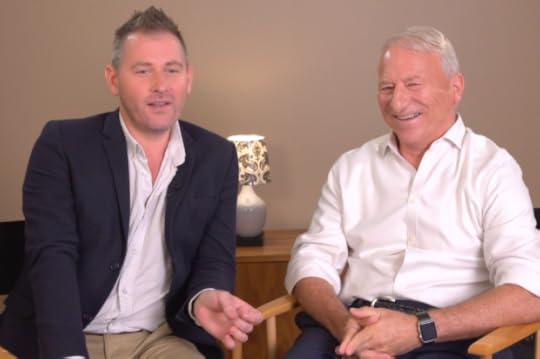
The success of anti-establishment candidates like Bernie Sanders and Donald Trump in 2016 signals that the era of voters accepting incremental measures to address America’s big problems is coming to a close, says Andy Stern, the author of “Raising The Floor: How A Universal Basic Income Can Renew Our Economy And Rebuild The American Dream.”
Stern, a senior fellow at Columbia University and the former president of Service Employees International Union (SEIU), joined moderator Josh Zepps at the Democratic National Convention on Tuesday for a Facebook Live chat hosted by Salon. Zepps and Stern discussed the big issues facing our nation and how candidates like Sanders — and yes, even Trump — are bringing us closer to the big ideas needed to address them.
“I think this is the last election where anything that looks small is going to seem attractive to people,” Stern said. “Because the forces that they’re up against, in terms of the global economy and technology, are so massive that I think incrementalism is just not going to work.”
“When it stops working, just like trickle-down stopped working, then people need a different answer,” he continued. “They will search to the right and to the left for a different answer, and the question is who’s going to have an appropriate way to go forward.”
WATCH: “Hunger Games” actress Elizabeth Banks mocks “over the top” Trump entrance

Actress Elizabeth Banks looks over the podium area during a sound check before the start of the second day of the Democratic National Convention in Philadelphia , Tuesday, July 26, 2016. (AP Photo/J. Scott Applewhite) (Credit: AP)
Actress Elizabeth Banks mocked Donald Trump’s “over the top” entrance from the first night of the Republican National Convention on Tuesday, emerging from a dimly lit, fog-strewn backstage area to Queen’s “We Are The Champions” — although presumably the Democrats sought and obtained permission to use the song.
“I don’t usually say this about Donald Trump, but that was over the top,” she said when she finally reached the podium. “I confirmed it, just now. The Trump campaign is so hard up for money, I just bought that fog machine on eBay for $30.”
Banks later noted that in “The Hunger Games” films, she played “a cruel, out-of-touch reality TV star who wears insane wigs while delivering long-winded speeches in a violent dystopia — so when I tuned in to Cleveland last week, I was like, ‘Hey, that’s my act!'”
She went on to introduce the work that Hillary Clinton has done with children since the beginning of her career.
Watch her entrance and speech below via TPM.
Out of the mouths of babes: When street harassment comes from boys, not men

(Credit: Diane Diederich via iStock)
There is no graceful way to tell stories like these. One night last summer, while walking through downtown Evanston, Illinois, alone yet surrounded by people, I felt a hand slip between my legs. As quickly as I could react — “Are you fucking kidding me?” were my exact words — the figure of my assailant was already running down the street. I walked behind him for several blocks, making direct eye contact every time he looked back to measure our distance. Let me tell you something about his face: it was that of a teenager. Like, he was literally a teenager.
When I caught up to him, I said, matter-of-factly, “You put your hand between my legs.” He denied. “You came up behind me, touched me, and ran away.” He called me crazy. “I don’t appreciate you calling me crazy when we both know what happened.” Finally he told me to “chill,” because it was “just a thing for YouTube.”
I’ll never know if this incident really was an Internet stunt, or if it was filmed at all. I do know I was humiliated. That night kicked off what would become a string of gendered harassment from boys significantly younger than me, including catcalls through school bus windows and non-consensual attempts to photograph my body.
Harassment is nothing new in my life. I was barely aged in the double digits during my earliest memories of male drivers honking as they zoomed past me or classmates making sexual comments. Nowadays, I, like many women, endure street harassment on a near-daily basis. Usually the perpetrators are at least old enough to remember the ‘90s.
With experience, I’ve developed a toolbox of responses to unwanted attention from strangers. There are times when I have patience and times when I have less. There are times for snark and times for simply getting away. There are times for “please don’t call me that” and times for “pay me, bitch.” But the proper response to violation by an adolescent is anything but obvious.
Our reactions to harassment reflect some composite of how we would like to react, threat assessment, and the feelings triggered in us by the action. How would I like to react to pimple-faced boys who holler at me as I walk by Chipotle where they’re probably eating on their mom’s tab? A heartfelt chat would be nice, in which I don my imaginary therapist cap and ask him why he felt compelled to speak to me in this manner. History is unearthed, pain is laid bare. As he comes to understand how he’s disrespected me, he slowly begins to know his own power. (Realistically, this all takes place while I choke back laughter at the idea of him thinking he knows how to please a girl.)
In an ideal world, there would be no need to nurture men out of their sexist ways to begin with. Yet here we are. In the real world, harassment is commonplace and womanhood is a target. We expect it and, still, we can be caught off guard. If nothing else, harassment from minors startles me because I don’t anticipate it coming from them. But the element of surprise, while enough to stimulate the nervous system, is distinct from true threat.
Harassment is violent in itself, but it is also violent for its suggestion of escalation. The space between “harmless” boundary-crossing and “actual” boundary-crossing is mostly imaginary; women experience this in the split-second between hey beautiful and fucking slut. When I acknowledge the bullshit men sling my way, it is in refusal of silence, because silence feels like submission. I didn’t always operate this way. Growing up, I learned to ignore what I wished not to hear. Expending energy means caring and caring means someone has influence over you. But silence also condones. Silence forgives and conceals and breeds more quiet. So when I choose to be loud, whether through my voice or my body, it is to call out or call the bluff on attempts to make me small.
However, I don’t fear a middle schooler following me home. I don’t look at a 15-year-old dude and think about all the ways he can hurt me. The actions of boys may upset or offend, but they do not threaten me. While boys employ gendered power dynamics in their harassment of older women, it is not the only dynamic at play. Perhaps part of the fun is the very fact that I am an older woman (I’ll get to that later). At the end of the day, though, I’m the grown-up and they are kids. Maybe silence is the sound of the bigger person. Maybe this silence says I believe you’re better than this, but right now, I don’t know how to get you there.
If I am not subordinate, if I am not intimidated, am I really being harassed? What does it mean when a child objectifies you? He and I both know nothing will come of his juvenile efforts. What, to him, is the point? To answer this, we may consider street harassment at large. When a guy asks how I’m doing, baby, is he really inquiring? No. Is he really trying to get to know me? No. When he yells that I have nice legs through the window of his car, does he intend for his advances to lead anywhere? No. He has made it impossible, because he is gone before I can respond. Men approach women on the street to get a rise from us, to send messages to other men, or simply to express their opinions, which they’ve been taught to believe is their right. Likewise, no kid is trying his luck at romance with me. It’s about testing the waters, showing off. These are kids being kids, but they are also boys practicing being men.
We teach masculinity from birth. I have confronted this personally and professionally: A boy in my care, months shy of his eighth birthday, ashamed that a girl beat him at Duck Duck Goose. A 13-year-old, an eldest brother, helping to wheel compost from one end of my farm to the other. “This is man’s work!” he proclaims. “I’m a woman and I do this work all day,” I remind him. Somehow these statements are not incompatible in his mind.
Both as a woman and an adult, I feel responsible for encouraging positive conceptions of gender in youth I interact with, and, sadly, this often means challenging destructive beliefs that have already taken root. But womanhood itself complicates things. We live in a culture that sexualizes female bodies as early as childhood. After years of infantilization, we will be fetishized in our caretaking roles — MILFs, hot teachers, sexy nurses — until we’re perceived as too old to be fertile, when our sexuality, and our authority, become laughable. Consciously or not, boys recognize this. That’s the joke behind harassing women. The joke is we’re the joke.
I’d like to be able to go outside without worries of molestation or verbal abuse or long stares or pet names from mouths of people who have not earned it. I want this for myself; I want it for other women and girls even more. But I also want it for the boy who fears losing to a chick, and the 13-year-old who can only express his pride in a job well done by calling it manliness, and even that teenager from Evanston. When boys act like men in the worst ways possible, it’s because they’ve inherited a legacy of misogyny. They deserve more and so do I. In those moments on the street, I cross my fingers for both of us.



